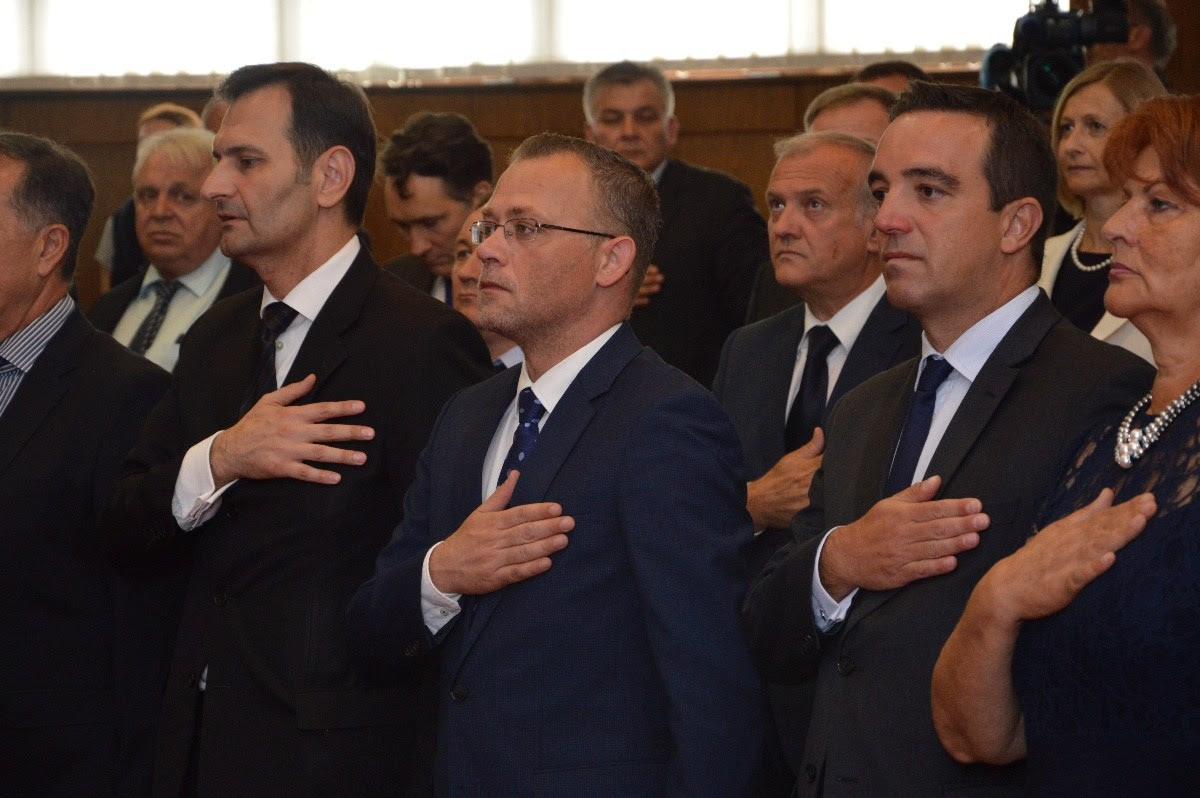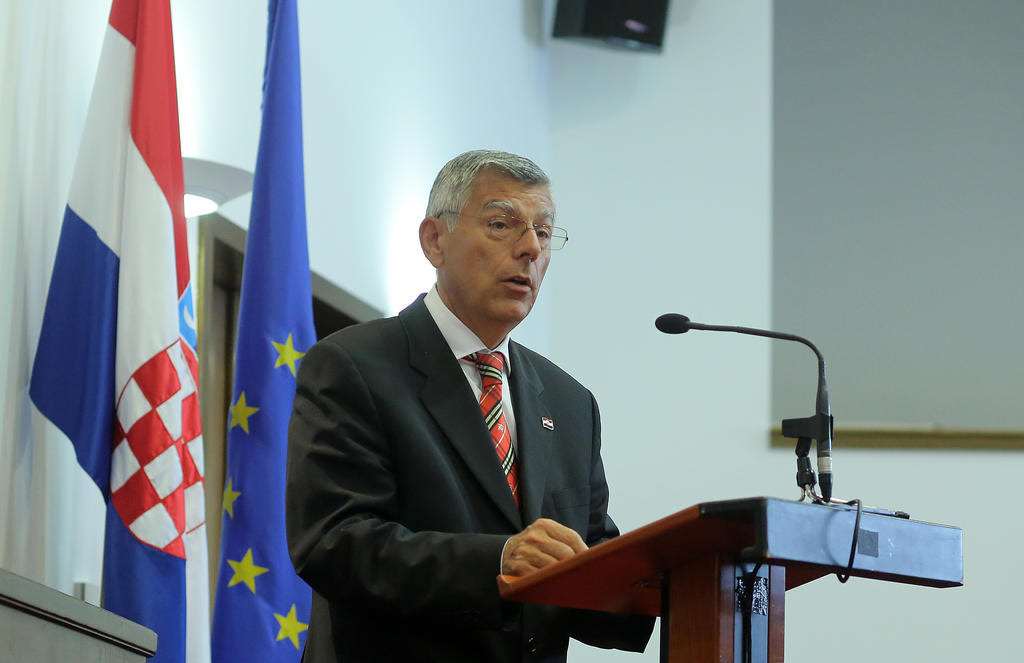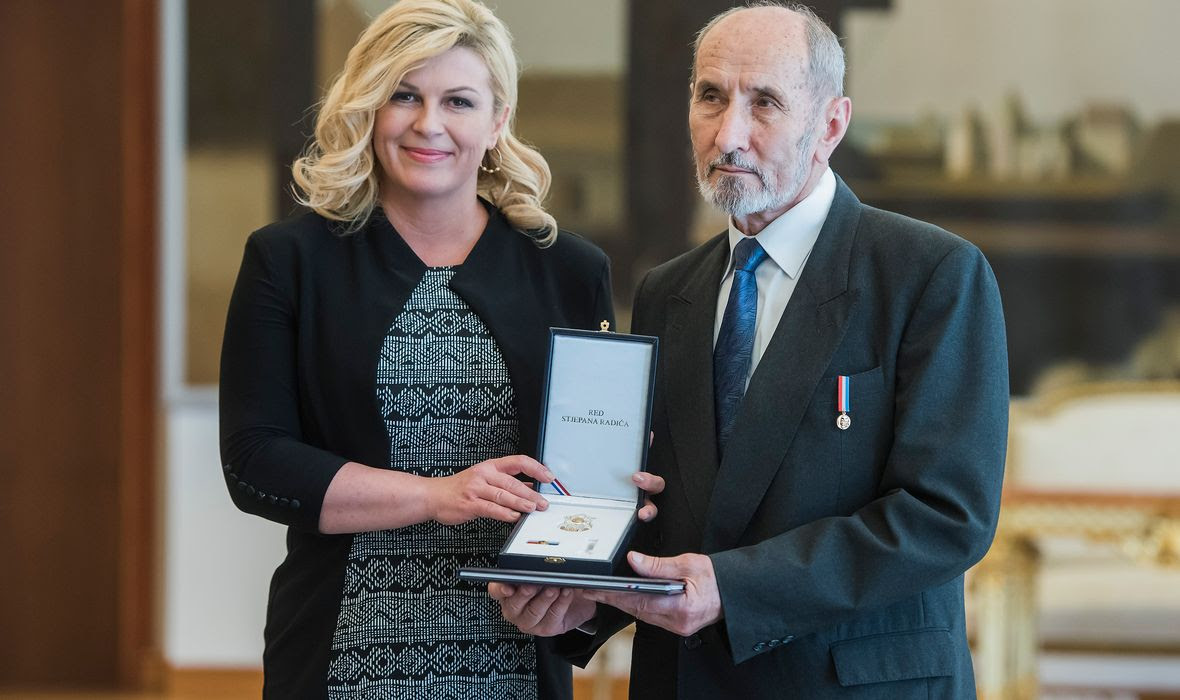
From Left front: foreign and internal affairs minister Miro Kovac, minister for culture Zlatko Hasanbegovic, defence minister Josip Buljevic, minister for employment and retirement Nada Sikic
Photo: vlada.gov.hr
23 August was the Day of Remembrance for the victims of all totalitarian and authoritarian regimes in Europe and this August 23rd 2016 the Croatian Parliament devoted itself to this remembrance for the first time since its independence and secession from communist Yugoslavia in 1991. Minister for the culture Zlatko Hasanbegovic representing PM Tihomir Oreskovic, foreign and internal affairs minister Miro Kovac, defence minister Josip Buljevic, minister for agriculture Davor Romic, minister for social politics and youth Bernardica Juretic, minister for employment and retirement Nada Sikic, minister for science, education and sport Predrag Sustar, members of parliament, diplomatic core representatives, members of the academic community and religious and business representatives made this day a truly great one for Croatia.
This has been a truly momentous day for Croatia’s democratic government.
This is so because the former communists, who call themselves antifascists even though they hold nothing in common with world's anti-fascism due to the multitudes of crimes committed in their communist name and regime, holding power in Croatia throughout this past quarter century have been fighting fiercely against even the notion that communism left many innocent victims behind it, let alone acknowledging the awful truth of horrendous communist crimes and purges. The European Day of Remembrance for Victims of Stalinism and Nazism was established by the European Parliament Declaration of 23 September 2008 while the same parliament confirmed August 23 as a Europe-wide day of remembrance for the victims of all totalitarian and authoritarian regimes by its resolutions dated 2 April 2009 on European conscience and totalitarianism. In 2011, Croatia's lawmakers adopted a declaration designating 23 August as a memorial day for victims of all totalitarian and authoritarian regimes but observance of this event, a commemoration, was never before brought into the chamber of Croatian parliament, instead gatherings occurred at the many mass grave and pits sites where remains of victims of communist crimes lay. The Croatian parliament 30 June 2006 passed a declaration on the condemnation of crimes committed during the totalitarian communist regime in Croatia 1945-1990, which states that all totalitarian communist regimes were without exception marked by mass violations of human rights.
By marking the Black Ribbon Day, Croatia joined most of the EU member states that, in accordance with a recommendation by the European parliament, advocate contemplation of delicate and complex issues from our collective past as well as its preservation so that next generations could learn from it and build coexistence based on democracy and respect for the fundamental rights.

Zeljko Reiner
Speaker - Croatian Parliament
Photo: Hina/ Tomislav Pavlek/ tp
Croatian Parliament Speaker Zeljko Reiner said on 23 August 2016 that crimes committed by Nazis, Fascists and Ustasha in WW2 had been prosecuted and punished while crimes "committed by Communists against tens of thousands Croats" had never been prosecuted nor punished.
Addressing the commemoration, Reiner further said that the Communist regime resorted to repression in an attempt to send into oblivion the existence of Croats and some Jews, Germans and members of their ethnic groups "who were killed only because they had a different opinion". Reiner accused the Communist regime of persecuting and killing intellectuals, middle class members, clergy and nuns or the wealthy only to confiscate their property.
“In that, everything was wrapped up in a veil of silence and fear because the regime to its very end cruelly punished all who dared to speak about that… Instead of deserved punishment the criminals received medals, apartments and villas that were stolen from their victims, top positions not only in politics but also in administration, in companies, universities… Even in verbal condemnation of communist crimes we lagged by years behind other countries who previously had communism and had implemented lustration – they shone a light upon the dark era of their history and Croatia had not done that.”
Reiner went on to say that a kind of "deja vu " of Nazi-Fascism happened in the form of spreading a Greater Serbia idea in 1990’s and the aggression against Croatia, and he called for bringing an end to manipulations with historical truths.
He called for "shedding light of the truth" on that dark side of Croatia's recent history. “Generations brought up on untruths, on myths by which attempts are made to justify or at least minimise communist crimes and on keeping silent about the crimes have no future because, as St Paul had said a long time ago: ‘Woe unto them that call evil good, and good evil; that put darkness for light, and light for darkness”. That’s why the European Parliament called upon all communist and post-communist parties in their member state countries, who had not already done so to review their communist history and their personal past, to clearly distance themselves from crimes perpetrated by totalitarian communist regimes and fully and clearly condemn them.”
Reiner said that the Croatian parliament expressly gives its support to democracy and all the values and human rights upon which it rests. “In doing so the Croatian parliament follows and promotes that which was expressed by the citizens of Croatia at the beginning of the last decade of the last century and for which more than 15,000 veterans had lost their lives.”

Croatian president Kolinda Grabar-Kitarovic
with Nikola Stedul
survivor of 1988 assassination attempt in Scotland
by Yuogoslav communist secret police
Photo:Neja Markicevic/Cropix
On the same day, 23 August 2016, Croatian president Kolinda Grabar Kitarovic bestowed a medal of honour “Stjepan Radic” to the former Croatian political émigré and victim of the 1988 attempted assassination in Scotland by Yugoslav Communist Secret Police UDBA Nikola Stedul for his exceptional and long-lasting fight for national and social rights and the advancement of the Croatian people. On that occasion president Kitarovic emphasised how it is time to “morally and politically condemn the Yugoslav communist regime as totalitarian and to implement judicial processes in order to determine the guilt for the worst kinds of state terror committed during those times”. I do hope that president Grabar will work harder at influencing the Croatian government and parliament into actually delivering the means by which the judicial processes she talked of will be possible and unhindered. What a great thing it was to see that day when the Croatian Parliament consisting of many representatives that are directly associated with the past communist regime either through personal functions/job or as children or grandchildren of highly positioned communist operatives in former Yugoslavia actually got to remember the victims of communist crimes. Somehow though, the loudly calling for shedding of light upon those crimes in the Parliament, which actually is The place for the passing of laws that would enable such a lustration, does not leave one with full confidence in such a prospect of due justice. Unease niggles on. It’s election time in Croatia and former communists and pro-Communists are pushing to get elected into the new government. If they are successful, Croatia’s path to reckoning with communist crimes will once again be shoved backwards into corridors of darkness and injustice. Ina Vukic, Prof. (Zgb); B.A., M.A.Ps. (Syd)



Nema komentara:
Objavi komentar